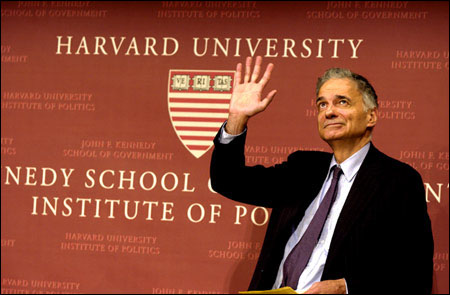Candidate Nader has tumultuous time at K School

Third-party candidates who never win national elections have played a crucial role throughout the history of U.S. electoral politics, Ralph Nader told an overflow crowd of students Monday night (Oct. 4) at the John F. Kennedy Jr. Forum.
“Would you have told the abolitionist candidate in the 1840s to withdraw and just leave it to the Democrats and the Whigs?” the Independent candidate for president asked a student who urged Nader to drop out of the race.
Nader repeatedly made the point that third-party candidates force the major parties to take a stand on crucial issues, which in the past included the abolition of slavery, women’s suffrage, and the rights of workers. The stakes today, Nader contended, are urgent.
“We have the weakest structural democracy in the Western world,” he said. “We have an electoral system where the person who comes in second becomes the president of the United States. We have seen a takeover of our government by increasingly fewer giant corporations that have no allegiance to our country . . . A system that ignores utterly any recognition of any internal reform is a system that needs a jolt.”
Traditional Democrats and “the left” have adopted a “least worst” strategy, Nader said, because these voters feel there is no “best” candidate for whom to vote. On major issues he sees the two parties reacting as one and the same: the massive military budget, corporate globalization, Iraq, corporate crime, corporate welfare, and redistricting, among others. After delineating this list of ills, Nader said, “I can guarantee you by my prior experience that your metabolism has not gone up one iota because we’ve become numbed by the disintegration of our democratic society.”
Nader observed that he differs from other candidates in that he refuses to flatter voters – or audiences. This was clear in his challenging responses to questions and in his assertion that the country, and the audience, was full of “liberals incapable of any social indignation, who have attained their own status in life and feel pretty comfortable about it, estranged and distanced from the raw material of poverty and desperation . . . that’s sweeping our country.”
A palpable undercurrent of tension in the audience eventually erupted. Out-of-turn comments were answered by disapproval from the crowd, deteriorating into a shouting match that ended with an incongruously harmonious chorus sung by a group of Lyndon LaRouche supporters.
In contrast with other presidential candidates, Nader never directly said “Vote for me.” He advised audience members to vote their conscience, to vote for third-party candidates, and, if they were voting for John Kerry, to make demands of him. The closest Nader came to directly asking for votes was during a humorous impersonation of a bombastic candidate giving a canned stump speech – a performance which demonstrated that, against daunting odds, Ralph Nader still has a sense of humor.




